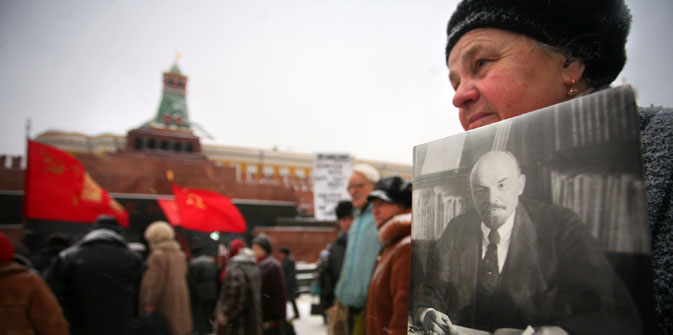
Muscovites see no point in Lenin's mausoleum in Red Square. Source: AFP / East News
Today's generation of Russians have rather mixed feelings when it comes to the leader of the Bolshevik Revolution. The issue of burying Lenin's body, which is still kept in a mausoleum in Red Square, comes up again and again. For the older generation, however, he remains an important historical figure, whereas young people are often unable to tell him from a comic book hero.
Viktoria is in her late 40s or early 50s, and she said she thinks that Lenin is a person who destroyed a huge country. To her, he is definitely not a good character in Russian history. Whereas Yulia, 35, is convinced that he is a hero and a politician of genius. "Lenin's body is not an exhibit but a legend, like the Egyptian pharaohs," she said.
Anna is slightly older than 20. She said she views Lenin as part of the country's past that is long over. She said she sees no point in his mausoleum in Red Square.
"I don't consider the mausoleum to be an interesting building either from the point of view of history or architecture, unlike, say, the original Christ the Savior Cathedral. I find the fact that there is a mummified body inside it distasteful for several reasons. I think that mummification is an insult to the memory of a person who is dead and is nothing but a show," she said.
Alexander, 30, said that Lenin is a person who staged a coup d'etat and nothing else. Most people describe him as just a historical figure without attaching any emotion to him.
These Russians’ views fall inline with a poll conducted by the Levada Center in May 2013, in which about 40 percent of Russians said they had a somewhat positive view of Lenin, while 18 percent said they had a somewhat negative view of him. Fifteen percent said they had a positive view of Lenin, 16 percent were undecided and 1 percent did not know who he was.
As for other political leaders, the one who has the biggest number of Russians thinking well of him is Leonid Brezhnev, who ran the Soviet Union in the 1970s, while Mikhail Gorbachev is the least liked of all Soviet leaders.
The Levada Center survey on Lenin in 2011 showed the majority of those polled said that "Lenin's memory will remain in history, but no-one will follow his path" (34 percent) and only 5 percent said that his ideas had a future.
As for the question of whether Lenin's body should be buried, the majority, about 40 percent, said they think it should.
A senior lecturer in Russian history at the Peoples' Friendship University of Russia, Boris Yakemenko, is convinced that Lenin's significance as of a historical figure is steadily declining.
"These days one cannot say that the figure of Lenin has an influence on the way of thinking and the system of values of the majority of Russians. He has turned into an ordinary historical figure, not much different from many others. He is interesting to study but this experience is not relevant for the present moment. People in general are not very well versed in issues of history. I work at a university and I see that to my students, this man is a nobody. Yes, he carried out the revolution and created the Soviet state, but that's it. Unlike Stalin, he is even not linked to the subsequent tragic events that the country lived through," he said.
According to Yakemenko, for younger schoolchildren Lenin has become a figure they often confuse with a comic book character.
"Clearly, for them he no longer exists even as a historical figure. Grown-ups have endless conceptual arguments about Lenin but nobody defends him as a figure who has formed their views and values,” he said.
“For the older generation, however, Lenin is a symbol of the best that they have had in their lives, a symbol of a happy past. They simply cannot give him up."
As for the never-ending debate about the future of the mausoleum and Lenin's body, the historian said he believed that it requires a political decision but that political decision can be taken only after the current older generation are all gone.
"I think at some later point it will make sense to move the mausoleum to the house outside Moscow where he lived, in Gorki. Thus it would be preserved as a museum and that would put an end to the debate about the need to bury Lenin's body. But in any event, that could be done only after the generation that still views him as a symbol is no longer with us. Now this issue still breeds political speculation," Yakemenko said.
All rights reserved by Rossiyskaya Gazeta.
Subscribe
to our newsletter!
Get the week's best stories straight to your inbox